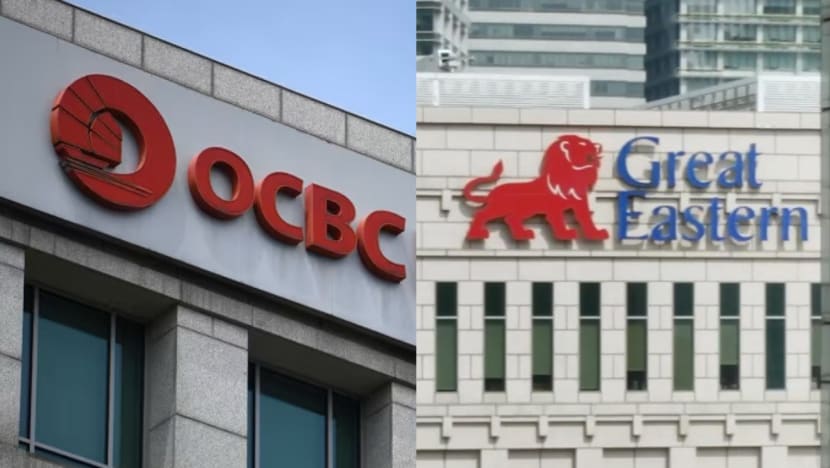Citing unhappiness among minority investors, SIAS seeks clarification from OCBC on Great Eastern offer
The retail investor advocacy group described OCBC’s privatisation bid for its insurance arm Great Eastern as having created a “dilemma to minority shareholders where they are not given a choice”.

Great Eastern shareholders on Jul 8, 2025 voted against a proposal to delist its stock, while OCBC said that its conditional exit offer had lapsed. (File photos: CNA/Calvin Oh and Great Eastern)

This audio is generated by an AI tool.
SINGAPORE: Citing “unhappiness” among minority shareholders of Great Eastern, the Securities Investors Association Singapore (SIAS) has posed questions to OCBC about the bank’s privatisation bid for its insurance arm.
Describing the offer as having created a “dilemma” for Great Eastern’s smaller investors, the retail investor watchdog on Friday (Jun 21) urged companies that intend to delist in future to “provide an offer price which is truly ‘fair and reasonable’ to all shareholders”.
A RECAP OF OCBC'S BID FOR GREAT EASTERN
OCBC, Singapore’s second-biggest lender, on May 10 announced a S$1.4 billion (US$1.03 billion) offer to buy the 11.56 per cent stake in Great Eastern that it does not own, with the aim to delist the insurer.
The bank made an offer price of S$25.60 per share, which it said represents a premium of 36.9 per cent over Great Eastern’s last traded price of S$18.70.
Last week, Ernst & Young – the independent financial adviser appointed to the deal – described the terms of OCBC’s offer as “not fair but reasonable”. However, it advised Great Eastern’s independent directors to recommend that minority shareholders accept the offer.
Following that, OCBC said in a separate statement that its offer price was “final” and extended the closing date of its offer to Jul 12.
The bank’s statement “omitted any reference” to the independent financial adviser’s opinion, said SIAS founder-CEO David Gerald on Friday.
He added that the retail investor watchdog has since received “numerous inquiries” from shareholders of Great Eastern “seeking clarity and transparency” from OCBC.
Several long-term shareholders have also previously told SIAS, as well as in the public through media interviews, that “they will not accept (OCBC’s) offer because they feel that (Great Eastern) has been trading below the true value for the longest time”, said Mr Gerald.
A group of about 125 minority shareholders, led by former remisier Ong Chin Woo, told CNA last week that they are “disappointed” with OCBC’s decision to not budge on its offer price.
As such, Mr Gerald from SIAS hopes that OCBC’s board can “respond adequately” to the concerns of these minority shareholders.
Questions included in a letter addressed to OCBC’s chairman Andrew Lee and members of the bank’s board on Friday include if the bank had considered the independent financial adviser’s opinion when it decided not to raise its offer price.
Mr Gerald also asked for the key factors that led OCBC to its offer price, how the bank justifies what is perceived as an “unfair” offer and if the bank has received feedback from its own shareholders regarding the potential reputational risks arising from this deal.
Related:
OFFER CREATED A "DILEMMA" FOR RETAIL INVESTORS: SIAS
In the media statement, SIAS described OCBC’s offer as an example that has created a “dilemma to minority shareholders where they are not given a choice to make a decision due to terms of the offer”.
“For example, if the company has acquired more than 90 per cent share holdings, it will be suspended for a period of time and shareholders who have not submitted their shares, regardless or not if they are agreeable to the offer price, will not be able to trade and their monies are locked up for a period of time,” wrote Mr Gerald.
OCBC said it had received acceptances for 1.74 million shares, or 0.37 per cent of Great Eastern shares as of Jun 13. This raises its stake in the insurer to 89.01 per cent, a sliver below the 90 per cent threshold before trading in Great Eastern shares may be suspended.
For a company to remain listed on the Singapore Exchange (SGX), at least 10 per cent of its shares must be held by the public. Such a trading suspension was also highlighted by the independent financial advisor as a risk for shareholders.
However, the exchange’s delisting rule requires delisting offers to be both “reasonable” and “fair” in the opinion of the appointed independent financial adviser – for which OCBC’s offer does not qualify.
This means that the remaining minority shareholders of Great Eastern “are now faced with the decision to accept an offer deemed unfair by the independent financial adviser, or potentially could find their hard-earned money locked up in an unlisted company for a long period of time”, said Mr Gerald.
“As SIAS monitors the investors’ sentiment on this issue, it is hoped by (Great Eastern’s) shareholders that OCBC reconsiders its position in light of the independent financial adviser's findings and the spirit of fair dealings by a financial institution,” he added.















